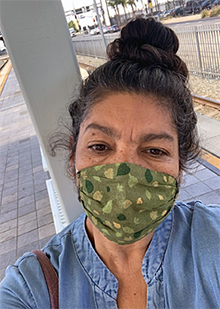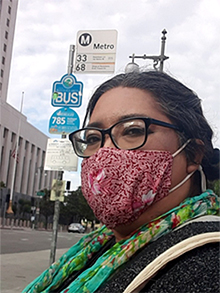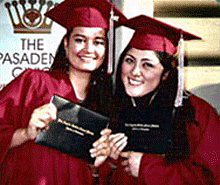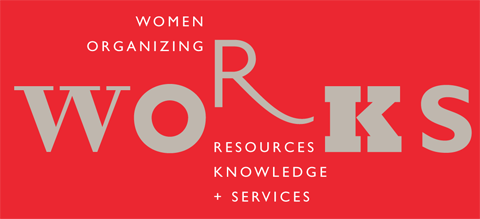Success & Leadership Stories
Search
Words That Inspire Us
Attitude is a little thing that makes a big difference.
Hard Decisions
 “I am making hard decisions in order to stay housed and take care of my health. Metro can expand the fare free service to the trains. We need to recover financially.”
“I am making hard decisions in order to stay housed and take care of my health. Metro can expand the fare free service to the trains. We need to recover financially.”
Martha M.
Metro rider for over 32 years
Now riding 45, 78, 79, 9l0, 950,
Red, Blue and Gold Lines.
I am a renter in Lincoln Heights. Having no fares to travel on Metro buses has helped me a lot in the last year.
During this time of the pandemic I lost the few jobs I had. I have taken care of small chilldren for years and traveled far away to Los Feliz and the Beverly Connection areas for work. Now I have no real or secure income except for earning a little bit here and there by taking on sewing jobs, cooking for people or caring for my granddaughter and other odd jobs. This does not mean that I have no expenses.
I had to make drastic decisions early last year and moved in to my brother’s apartment because I could not afford rent on my own. Currently I travel regularly to USC, to the school of dentistry, for a dental treatment which is long, painful and expensive. I need thousands of dollars to pay for it. For me every penny I can save counts toward my teeth, toward my heaIth, which in turn means getting back to work and stability. I take the 45 bus line, to the Red line, then I transfer to the Blue line to get to my dental appointments. Many times I don’t have the money for the train ride so I find myself taking more buses or wallking more which results in more transfers or time spent each way.
Public transportation is not a luxury. It is a means to generating income. It is a connection to, health services. It is a means to remaining invollved in my community and being able to see my family.
I ask the Metro Board to reassess priorities and make trains free also, not only for now, but forever. We can’t recover if we don’t come together. The people of the City and County of Los Anigeles are in dire need financially.
We need reall options and means to remain able to take care of ourselves and be able to get back to whatever jobs we can find.
The Change We Need
 “I have lived in Los Angeles all my life and have seen the changes in public transportation. The change we need during these hard times is of a FREE service. Metro is not only important, it is essential for me and thousands of people of color. Let’s FREE Metro.”
“I have lived in Los Angeles all my life and have seen the changes in public transportation. The change we need during these hard times is of a FREE service. Metro is not only important, it is essential for me and thousands of people of color. Let’s FREE Metro.”
Cecilia G.
Metro rider for 50 years
Now riding line 18, 68, 78, 251, 770, Dash D,
Red, Orange and Gold Lines.
I’m a 7th generation Angelina woman from Boyle Heights. My family has been using public transportation since those services started here in Los Angeles. We do not have cars because we know the importance of public transportation. I know all the lines and have ridden Metro since it was called RTD. As a student my parents would buy my bus pass and as a young adult I remember when paper transfers were discontinued. This affected me because it meant I had to pay more per trip since I could only afford the weekly bus passes. Currently I have a tap card and I load it as I go. I already live pay check to pay check and with the pandemic my salary has been compromised so I need to be extra careful with my finances. Each week I plan ahead to see how many trips I can afford. I could probably qualify for discount programs but it is a pain in the butt to apply. I know in the past I planned to apply but it meant taking time off of work to go to the Metro offices. I decided not to apply because I could not afford to miss work.
During this last year I had to visit relatives in the Valley and to get there I take the 68 bus, to the Red Line, to the Orange Line and then make my last transfer to get to their house. In several occasions I have chosen not to go check on my relatives because I can’t afford the train fares and I have various health conditions myself. I have to think about securing my medical care insurance which is an extra financial concern. I read the stats, and as a woman of color, I get paid .55 cents per dollar. We don’t live in a system of equity here. I have to make so many decisions daily and monthly just to stay afloat. I can’t afford a car, nor do I believe that is the solution. Public transportation should be a basic service included and guaranteed for all, not a worry and source of concern. It’s time to make Metro free.
The Trujillo/Mendoza Family Finds Home and Harmony
 Ana Mendoza and Pedro Trujillo had lived in Los Angeles for 15 years. Ana talks about living in slum housing not too far from Temple Villas where she now lives with her husband and their four children. Her family of six were crammed into a run down and crumbling one bedroom apartment. Her children slept in the bedroom and she and her husband slept on a converted sofa in the living room. For 12 years this was their routine.
Ana Mendoza and Pedro Trujillo had lived in Los Angeles for 15 years. Ana talks about living in slum housing not too far from Temple Villas where she now lives with her husband and their four children. Her family of six were crammed into a run down and crumbling one bedroom apartment. Her children slept in the bedroom and she and her husband slept on a converted sofa in the living room. For 12 years this was their routine.
“If it wasn’t bad enough that our children had to squeeze themselves into one bed, when it rained, the water always came in through the window. During the summer time, the roaches also slept with us.” Vermin were a constant problem. “There were so many of them that traps and other things we tried did not work.” They finally adopted a cat that helped rid them of that problem. “The landlords simply did not care about our conditions. All they wanted was to get their rent money and everything else was up to us to try and fix.”
Pedro was a carpenter and worked sporadically when work was available. Ana scraped by with food stamps, collecting cans, and making and selling tamales. But all of that together was not enough even to cover the cost of basic necessities.
As their children grew to adolescence, the lack of privacy became increasingly difficult and tensions ran high. Ana saw a real deterioration in her family’s cohesiveness and sense of hope. “I noticed my children’s attitudes began to shift to a real rebellion against me and my husband. For the first time my oldest son’s grades were F’s and he began to show us a side of himself that was unusual.”
Then she heard about WORKS’ affordable housing developments through a relative. “I applied and hoped for the best.” She remembers just one question from her interview for the apartment: ‘Why do you want to live here?’ “The answer was simple to me; I wanted a better future for my children.” Her application was approved and her family moved into a four-bedroom apartment.
“My children are now happier; they feel like they can do anything.” Her son’s grades improved from F’s to B’s. “I began to take more interest in my children’s education by attending parent-teacher conferences.” Her oldest daughter Brenda, 21, is now a registered nurse and her daughter Jacqueline, 18, is in college. Her son will be graduating from high school this year. Now, the youngest who is 9, looks up to his older siblings.
Mrs. Mendoza reflects on her current situation. “I have friends now who are struggling like my family once did, where six are living in a one bedroom apartment and are paying the same rent I am.” She knows that nothing is gained without hard work and determination. “As a mother, I’ll do what is needed so that my children don’t have to feel hunger or be cold when they go to bed. Our lives have changed completely because we have this place; we would not be able to afford a beautiful place like this if projects like this were not in existence.”
Girls Get Going …. Up and Up and Up
 Ana, Laura, Natalie… They couldn’t be more different in terms of personality, family composition, dreams and desires. Each has an unmistakable style all her own: Ana, the quiet, studious one; Natalie, the self assured, independent one; Laura, the lively, humorous one. But they shared a common bond: being the children of immigrants who faced daunting economic, educational, and personal struggles. By and large, their parents had received only minimal education, most dropping out after middle school. And all three girls lived at Highland Village.
Ana, Laura, Natalie… They couldn’t be more different in terms of personality, family composition, dreams and desires. Each has an unmistakable style all her own: Ana, the quiet, studious one; Natalie, the self assured, independent one; Laura, the lively, humorous one. But they shared a common bond: being the children of immigrants who faced daunting economic, educational, and personal struggles. By and large, their parents had received only minimal education, most dropping out after middle school. And all three girls lived at Highland Village.
Before WORKS developed Highland Village, gang members, prostitutes, and drug dealers claimed the neighborhood as their own. Children walked through this dangerous scene day in and day out on their way to and from school. The road to a high school diploma seemed booby-trapped with all of the obstacles associated with neglected low-income communities—-teen pregnancy, soaring drop out rates, gang involvement, economic hardships, depression, and low self-esteem.
Emboldened by the support and structure offered by WORKS in this renovated apartment community, families began to stand up for their beliefs and people took notice. The Community Center hummed with activity, offering a variety of programs including English as a Second Language, after school tutoring, and computer instruction at no cost to residents and neighbors of Highland Village.
Almost six years later, the girls are now young women who have defied the odds. They all graduated from high school and are currently enrolled in or attending college. They beam with pride at being not only the first generation to graduate high school in their families, but also the first to attend college. They will surely not be the last.
